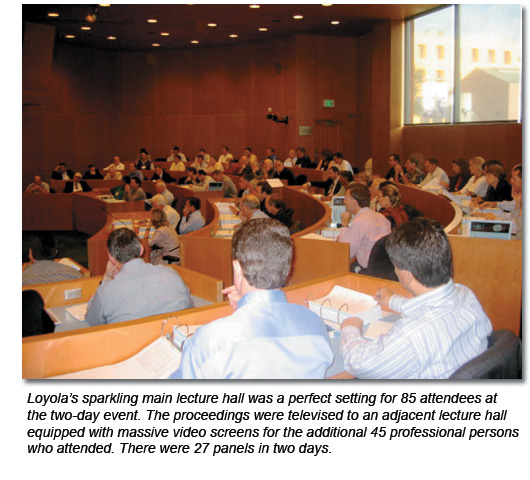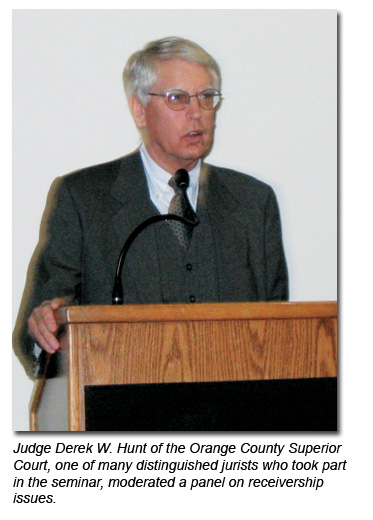|
Fall 2004 • Issue 15, page 1
"Loyola II" Covers Receiverships A to Z in 2-day LA Program
By Rense, Kirk*
 Certainly the most encyclopedic teaching seminar ever presented on
receivers and re-ceiverships, the 2-day Receiver-ships in the New
Millennium: Part II program presented October 8 and 9 at Loyola Law School
of Los Angeles by the California Receivers Forum was a spectacular success
by any measure. Certainly the most encyclopedic teaching seminar ever presented on
receivers and re-ceiverships, the 2-day Receiver-ships in the New
Millennium: Part II program presented October 8 and 9 at Loyola Law School
of Los Angeles by the California Receivers Forum was a spectacular success
by any measure.
Professional receivers, property managers, business turnaround
specialists, accountants, title and escrow professionals, bankers and
insurance specialists from every corner of California (and several from
other states) convened in Downtown Los Angeles to share their expertise in
and learn both fundamentals and fine points of being a receiver and
receivership administration in 14 hours of lectures and presentations.
The program commenced Friday morning with a brief introduction to the
history and legal authority for the existence and appointment of
receivers, and concluded Saturday afternoon with expert panels on
receiver’s final reports and accounts at case closing and
post-receivership issues. Sandwiched between were presentations on
(almost) everything a receiver needs to know or may encounter while
serving his or her appointing judge.
Highlights of the seminar included:
-
Panels on the beginning stages of a receivership (types of receiverships
/ the process of obtaining appointment of and qualifying as a receiver /
the distinction between receivers and provisional directors);
-
Receivership procedures, funding the receivership estate, and how to
operate the receivership under both calm and stormy conditions;
-
How to, first, locate and, second, sell and make distributions of
receivership estate assets;
-
The impact on the receivership of state and federal statutes dealing
with health, safety and the environment;
-
Legal and practical aspects of operating different types of
receiverships – business receiver-ships, family law receiverships, hotel
and health care company receiver-ships, regulatory receiverships,
sub-standard housing receiverships, professional corporation liquidating
receiverships and post-judgment receiverships to collect judgments;
-
Issues of a more personal nature, such as the receiver’s rights and the
risks he or she incurs in operations and administration, compensation of
the receiver and her / his retained professionals for the work accomplished;
-
A 16-part overview of the accounting and tax issues that a receiver
should understand, supported with several hundred pages of exhibits,
guidelines and applicable statutes.
 Nearly every panel’s presentation was supported with written summations of
the applicable law and practice and forms and exemplars of key documents –
more than 700 pages, exclusive of the special tax materials already
mentioned. Nearly every panel’s presentation was supported with written summations of
the applicable law and practice and forms and exemplars of key documents –
more than 700 pages, exclusive of the special tax materials already
mentioned.
But the seminar wasn’t all business. Hosted breakfasts before each day’s
sessions allowed the 130 attendees to renew acquaintanceships, meet new
colleagues, swap war stories, gossip about the elections, baseball
playoffs, USC vs. Cal, Nicky and Paris Hilton and other important issues
of the day. Luncheons were special, featuring two terrific guest panels:
— Orange County Superior Court Judge Derek W. Hunt, Los Angeles County
Superior Court Judge Thomas I. McKnew, Jr., Los Angeles County Superior
Court Judge David. P. Yaffe, and former Los Angeles County Superior Court
Judge Diane Wayne (Ret.) on Friday spoke on and fielded questions about:
-
the appropriate use of receivers in different judicial settings,
-
the scope of judgment latitude judges allow their receivers in different
circumstances,
-
the closeness (or distance) of the relationship to be maintained between
receivers and their appointing judges/commissioners,
-
use of receivers in a criminal law setting,
-
the degree of protection they afford the receivers they appoint, and
many similar issues.
— Peter A. Davidson, Esq. moderated a terrific panel of federal and state
agency attorneys and regulators comprised of Kenneth H. Abbe, Esq.
(Attorney, Federal Trade Commission, Western Region); Cindy J. Eson, Esq.
(Branch Chief, Office of Enforcement, United States Securities and
Exchange Commission); Mark Richelson, Esq. (Supervising Deputy Attorney
General, Office of the California Attorney General); James K. Openshaw,
Esq. (Senior Corporations Counsel, California Department of Corporations,
Enforcement Division, Sacramento); and Victoria A. Dancy, Esq. (Counsel /
Section Chief, Resolutions and Receiverships, Federal Deposit Insurance
Corporation, Dallas Regional Office). The distinguished panelists
discussed:
-
the use of receivers in a variety of regulatory cases, ranging from
investor fraud to federal and state statutory violations;
-
the proper relationship between regulatory agencies and the receivers
they petition the court to appoint;
-
the degree to which they expect receivers to adopt or remain neutral on
the allegations made and positions advocated by the respective regulatory
agencies;
-
how the use of receivers in regulatory actions can benefit both the
involved regulatory agency and the public welfare the agency seeks to
protect, and many others.
Peter Davidson, Esq., a founding member of the Receivers Forum and whose
column “Ask the Receiver” appears in each issue of the Receivership News,
was also honored at the Friday Luncheon with a special award by California
Receivers Forum President Kyle Everett to thank Mr. Davidson for his many
years of service to the Forum. Among his many contributions was serving as
the first editor of the Receivership News (a voluntary post he held for
six years). He also designed the forum logo and selected the motto “In
Custodia legis” for the organization.
Other jurists participating in seminar presentations included:
-
The Honorable Bruce Mitchell, Commissioner, Los Angeles County Superior
Court, who joined with David Gill, Esq., Peter Davidson, Esq. and Alan
Mirman, Esq. in discussing, among other things, the risks inherent in
acting as a receiver , and the receiver’s authority to initiate suits on
behalf of the estate. Commissioner Mitchell is a contributor to the
Receivership News and a long-time friend of the Forum; and
-
The Honorable Gretchen Wellman Taylor, Commissioner, Los Angeles County
Superior Court, who joined with M. Daniel Close, CPA, in discussing the
bases for appointment and the use of receivers in Family Law courts.
Commissioner Taylor drew upon her seven years of family law judicial
experience (preceded by 10 years in family law private practice) in
illuminating the special challenges a receiver may face in assisting the
Family Law court in marital dissolution proceedings.
The Loyola II seminar was guided from its inception nearly a year ago by
its Chairperson Edythe L. Bronston, Esq. Ms Bronston was also chairperson
of the initial Loyola receivership seminar.
Ms Bronston’s principal assistant in both endeavors was Patricia Hinojosa,
Edy’s secretary, administrator, paralegal, factotum and emanuensis. Though
not the recipient of honorariums for her efforts, Ms Hinojosa is equally
deserving, proving the axiom that virtue is its own reward.
The backbone of the program was, as always, JBS & Associates. Jeanne
Sleeper, principal of that firm, ensured that every physical detail was
attended to and, with her associate Heidi Sutch, welcomed and assisted
each attendee with unflagging courtesy and graciousness. That the complex
seminar went off without a hitch is testimony to Ms Sleeper’s
conscientious- ness and to her and Ms Sutch’s boundless energy.
One of the first questions enthusiastically posed by a participant to Ms
Bronston at the conclusion of the conference was, “When’s the next one?”
|

